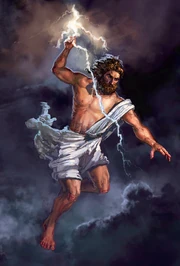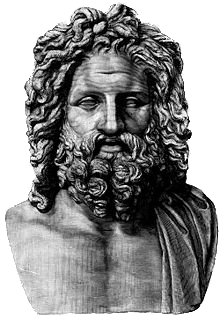m (Updating Category:Father → Category:Fathers (automatic)) |
|||
| (19 intermediate revisions by 6 users not shown) | |||
| Line 1: | Line 1: | ||
| − | '''Gods''' and '''Goddesses''' |
+ | '''[[:category:Gods|Gods]]''' and '''[[Goddesses]]''' in [[Greek Mythology]], are immortals who are referred to as "deathless ones" in ''[[Theogony]]''.<ref>Theogony of Hesiod (ll. 1-25)</ref> The various types of Gods are Protogenoi, [[Gigantes]], [[Titans]], [[Olympians]], Okeaniks, and Khthonics. Some of the main gods are [[Zeus]], god of lightning; [[Poseidon]], god of the sea; [[Ares]], god of war; [[ Apollo]], god of the sun; [[Hermes]], messenger of the gods; [[Hephaestus]], god of the forge, fire and smithing; [[Dionysus]], god of wine; [[Hades]], god of the dead; [[Artemis]], goddess of the hunt; [[Aphrodite]], goddess of love; [[Hera]], goddess of marriage; [[Demeter]], goddess of the harvest; and [[Hestia]], goddess of the hearth. |
==History== |
==History== |
||
| Line 5: | Line 5: | ||
== First Generation Gods (Olympians) == |
== First Generation Gods (Olympians) == |
||
| + | [[File:Zeus.jpg|thumb|Zeus]] |
||
| − | * [[Hestia]] (former member): Goddess of Home, Hearth |
+ | * [[Hestia]] (former member): Goddess of Home, Hearth and Family. When [[Dionysus]] came to join the Olympians Hestia resigned her place on the council so that there would not be a fight about throwing the number of council members out of place. |
* [[Demeter]]: Goddess of Plants, Agriculture, Seasons and Fertility. |
* [[Demeter]]: Goddess of Plants, Agriculture, Seasons and Fertility. |
||
| Line 21: | Line 22: | ||
* [[Hephaestus]]: God of Fire, Craftsmanship, Metalworking and Volcanoes. |
* [[Hephaestus]]: God of Fire, Craftsmanship, Metalworking and Volcanoes. |
||
* [[Hermes]]: God of Communication, Business, Thieves, Travel and Athletics. |
* [[Hermes]]: God of Communication, Business, Thieves, Travel and Athletics. |
||
| − | * [[ |
+ | * [[Dionysus]]: God of Wine, Revelry, Madness and Vegetation. |
| Line 35: | Line 36: | ||
<references/> |
<references/> |
||
[[Category:Race]] |
[[Category:Race]] |
||
| − | [[Category: |
+ | [[Category:Figures]] |
| − | [[Category: |
+ | [[Category:Groups]] |
| − | [[Category:Goddesses]] |
||
| − | [[Category:Males]] |
||
| − | [[Category:Fathers]] |
||
Revision as of 21:09, 2 November 2019
Gods and Goddesses in Greek Mythology, are immortals who are referred to as "deathless ones" in Theogony.[1] The various types of Gods are Protogenoi, Gigantes, Titans, Olympians, Okeaniks, and Khthonics. Some of the main gods are Zeus, god of lightning; Poseidon, god of the sea; Ares, god of war; Apollo, god of the sun; Hermes, messenger of the gods; Hephaestus, god of the forge, fire and smithing; Dionysus, god of wine; Hades, god of the dead; Artemis, goddess of the hunt; Aphrodite, goddess of love; Hera, goddess of marriage; Demeter, goddess of the harvest; and Hestia, goddess of the hearth.
History
The first gods Olympians born to Titans Kronus and Rhea. They had six children, five of which were eaten by Kronus. Later, Zeus, the last child who was not eaten, fed a mixture of wine and honey to Kronus, vomiting his brothers and sisters. In other myths, Gaea wrapped a rock with baby clothes and a blanket with Kronus thinking it was Zeus. This started the Titanomachy. Later, after the gods won, they had children who would also be gods. Ouranos's remains caused seafoam, which turned into Aphrodite.
First Generation Gods (Olympians)

Zeus
- Hestia (former member): Goddess of Home, Hearth and Family. When Dionysus came to join the Olympians Hestia resigned her place on the council so that there would not be a fight about throwing the number of council members out of place.
- Demeter: Goddess of Plants, Agriculture, Seasons and Fertility.
- Hera: Goddess of the Sky, Marriage, Women, Family and Power. Queen of Olympus.
- Hades (unofficial member): God of the Dead, Death, Darkness, Riches, Mortality, Afterlife and Metals. Ruler of the Underworld and the Subterranean Regions. While he was not technically an Olympian his importance is just as great as any of them and greater so than others.
- Poseidon: God of the Oceans, Earthquakes, Storms, Natural Disasters, Horses, Aquatic Creatures, Drought, Water Bodies, Gales and Marine Weather. Ruler of the Mediterranean Regions.
- Zeus: God of the Sky, Air, Lightning, Thunderstorms, the Sun, the Moon, Celestial Bodies, the Human Race and Fate. Ruler of Olympus.
Second Generation Gods (Olympians)
- Athena: Goddess of Wisdom, Warfare, Crafts and Civilization.
- Apollo: God of the Sun, Light, Knowledge, Music, Poetry, Prophecy, Diseases and Healing.
- Artemis: Goddess of the Moon, Hunting, the Wild, Chastity, Maiden Girls and Childbirth.
- Ares: God of War, Violence, Bloodshed and Endurance.
- Aphrodite: Goddess of Love, Emotions, Charm and Beauty.
- Hephaestus: God of Fire, Craftsmanship, Metalworking and Volcanoes.
- Hermes: God of Communication, Business, Thieves, Travel and Athletics.
- Dionysus: God of Wine, Revelry, Madness and Vegetation.
Titans, now accepted as "Gods"
- Iris: Goddess of Rainbow and Messages.
- Hecate: Titan/Goddess of Magic and Crossroads.
- Prometheus: Titan of Mankind
- Epimetheus: Brother of Prometheus
- Helios: Titan of the Sun
- Selene: Titan of the Moon
References
- ↑ Theogony of Hesiod (ll. 1-25)
